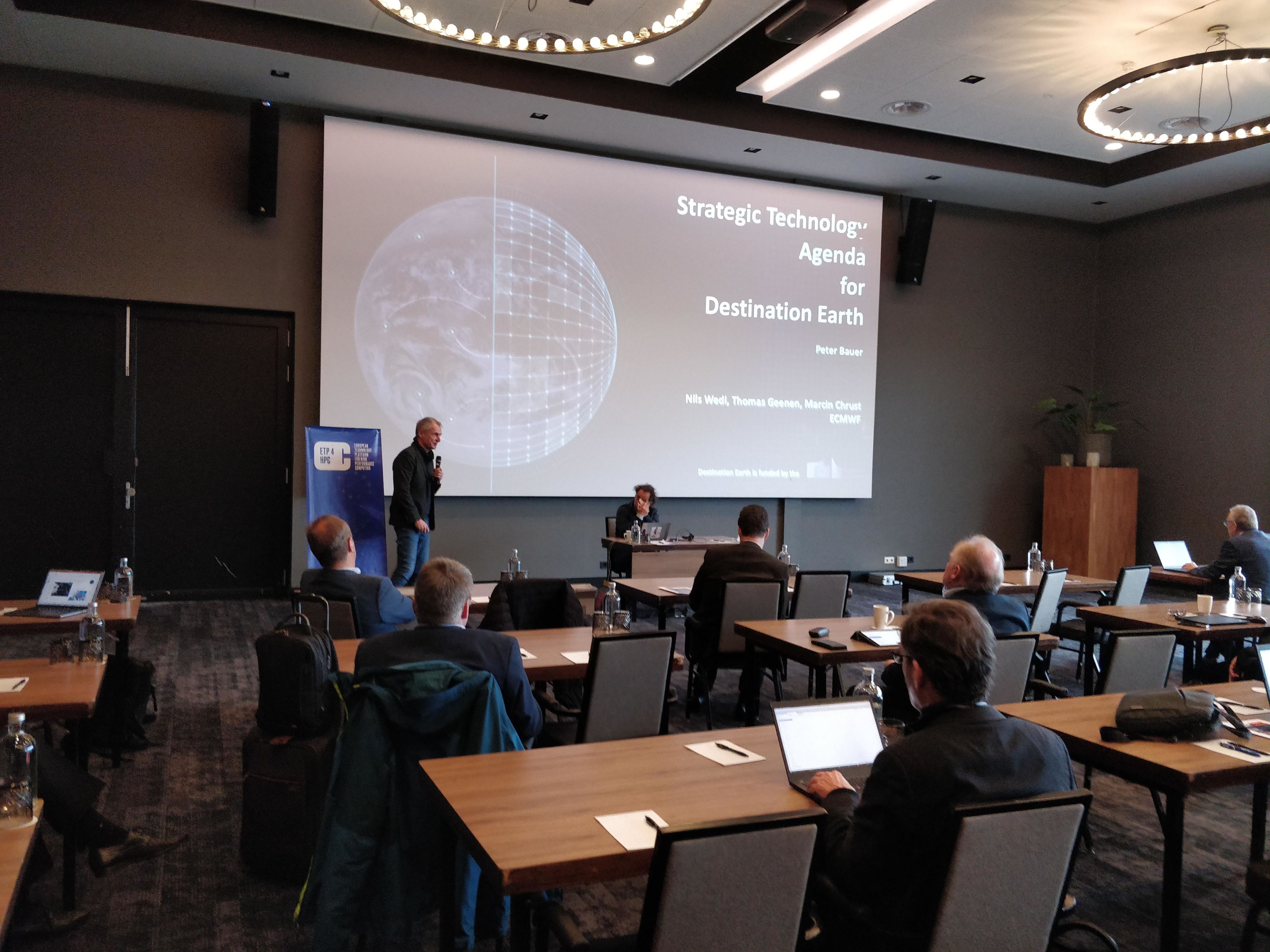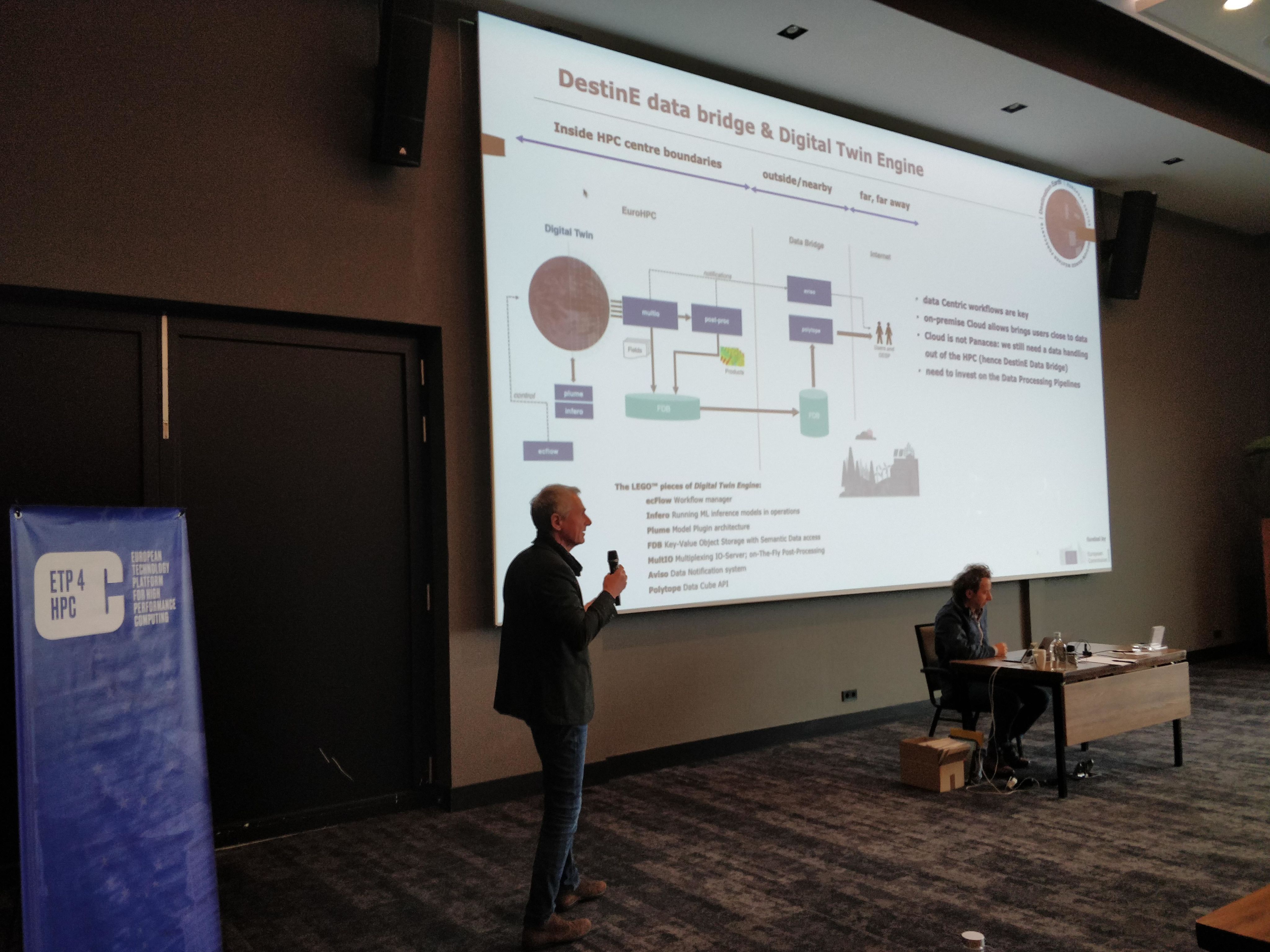ECMWF digital twins feature at the first open ETP4HPC conference

Back to ECMWF - Destination Earth main page
The European Technology Platform for High-Performance Computing (ETP4HPC) invited Peter Bauer, Director for Destination Earth at ECMWF to talk at its first ever “open to all” conference. ETP4HPC reunited some of the key names of European high-performance computing. Dr. Gustav Kalbe, Acting Director for Digital Excellence and Science Infrastructure at DG CNECT, and Anders Jensen, Executive Director at EuroHPC JU were the other two guests invited to deliver keynote speeches. The European Centre for Medium-Range Weather Forecasts (ECMWF) and ETP4HPC have signed a deal to cooperate in the technology agenda for implementing ECMWF digital twins in the frame of Destination Earth (DestinE).
For the first time ever ETP4HPC, the European industry-led think-tank for high performance computing (HPC), organised an open conference coinciding with the celebration of its General Assembly, which is for members only. The meeting took place in Sassenheim, near Amsterdam, and gathered some of the key names of the European HPC ecosystem.
The three guests invited to address keynote speeches are related to DestinE, the ambitious initiative of the European Union to create a digital replica of the Earth system in support of policy making and science face to the challenges of climate change.
Dr. Gustav Kalbe, Acting Director for DG CNECT, the main DestinE funding entity, has also the main responsibility for the initiative within the European Commission. Dr. Kalbe informed the ETP4HPC community about the status of the European HPC strategy and the corresponding investments currently underway at DG CNECT. Initiatives like DestinE are important to demonstrate the value of these investments.
The EuroHPC JU manages both the computing capacity available from EuroHPC and the supporting strategic software developments that, among others, will host ECMWF’s digital-twin simulations. Jensen detailed the latest developments at EuroHPC JU, the project funding offered from the 2023 work programme and gave insights into the future of HPC platforms in Europe.

Another moment of Peter Bauer's address during the ETP4HCP conference. Credit: ETP3HPC
Another moment of Peter Bauer's address during the ETP4HCP conference. Credit: ETP3HPC
Peter Bauer gave an overview of DestinE, why extreme-scale computing and data handling matter and how previous European Commission digital technology investments helped prepare for DestinE. He also updated the audience about the partnership agreement between ECMWF and ETP4HPC for developing a strategic technology agenda for ECMWF digital twins in the frame of DestinE. Bauer also participated in the General Assembly on behalf of Destination Earth and ECMWF.
After this address, we have requested Peter Bauer to explain in more detail the tight links between ECMWF and ETP4HPC, now reinforced with the deal related to Destination Earth digital twins.
The following is a transcription, edited for readability, of Peter Bauer's explanation.
“The cooperation between ECMWF and ETP4HPC started about 9 years ago, when we became a full member of the organization. It’s a membership club including technology providers, HPC centers, application-oriented entities like us, small and medium-sized enterprises... and it goes beyond Europe, with members such as Intel or Nvidia.
Our collaboration started with that membership. We were seeking to enter a dialogue with this entire HPC (data, internet of things, smart networks...) community about what is going to be the future of this technology and how we can benefit from these developments.
We have our own HPC system, and we highly depend on digital technologies, so entering that forum was important for us in order to adjust our operations to emergent technologies, because it’s a very complex, fast-evolving environment.
It also allowed us to introduce our own thinking, because they operate in terms of general-purpose technology, serving a wide range of users with very different requirements. It was important for us to explain our specific needs to the industry, from the weather and climate prediction background, making them aware of our specific challenges concerning digital technologies.
That perspective led to running many projects together and with individual members of ETP4HPC. Over time I think we engaged in some 15 or 20 projects with substantial funding from the European Commission and framed into our Scalability Programme, that we have run since 2013.
In the frame of Destination Earth we have taken this engagement a step forward. Given that ETP4HPC creates strategies for software and technology development, we thought they could do the same for us, tailoring a specific digital technology research agenda for the ambitious goals of DestinE.
We have requested ETP4HPC to advise us on the potential developments in computing, big data handling or machine learning from their industrial, general-purpose view. These technologies depend largely on what the HPC companies are doing and ETP4HPC can help us better understand what we need to work on, and where to invest for the best possible outcomes for Destination Earth.
With the agreement, we are directly funding ETP4HPC to develop for us a so-called Destination Earth Technology agenda. In substance, we request them to guide us on specific topics like HPC, data handling or machine learning, and where they see the biggest challenges and solutions lying ahead of us to help Destination Earth become effective.
The results are expected by mid-next year, at the end of phase one of Destination Earth.
It was great to meet so many colleagues at the ETP4HPC conference, and a very good occasion to update everyone on Destination Earth, with a focus on the importance of the EuroHPC JU resources we have been granted to run Destination Earth calculations. It was also important to highlight the importance of our collaboration with ETP4HPC, and tell them, first person, how valuable they are for us, for planning our future projects in technology.”
Read more about the partnership contract between ECMWF and ETP4HPC
Destination Earth is a European Union funded initiative launched in 2022, with the aim to build a digital replica of the Earth system by 2030. The initiative is being jointly implemented by three entrusted entities: the European Centre for Medium-Range Weather Forecasts (ECMWF) responsible for the creation of the first two ‘digital twins’ and the ‘Digital Twin Engine’, the European Space Agency (ESA) responsible for building the ‘Core Service Platform’, and the European Organisation for the Exploitation of Meteorological Satellites (EUMETSAT), responsible for the creation of the ‘Data Lake’.
We acknowledge the EuroHPC Joint Undertaking for awarding this project strategic access to the EuroHPC supercomputers LUMI, hosted by CSC (Finland) and the LUMI consortium, Marenostrum5, hosted by BSC (Spain) Leonardo, hosted by Cineca (Italy) and MeluXina, hosted by LuxProvide (Luxembourg) through a EuroHPC Special Access call.
More information about Destination Earth is on the Destination Earth website and the EU Commission website.
For more information about ECMWF’s role visit ecmwf.int/DestinE
For any questions related to the role of ECMWF in Destination Earth, please use the following email links:
